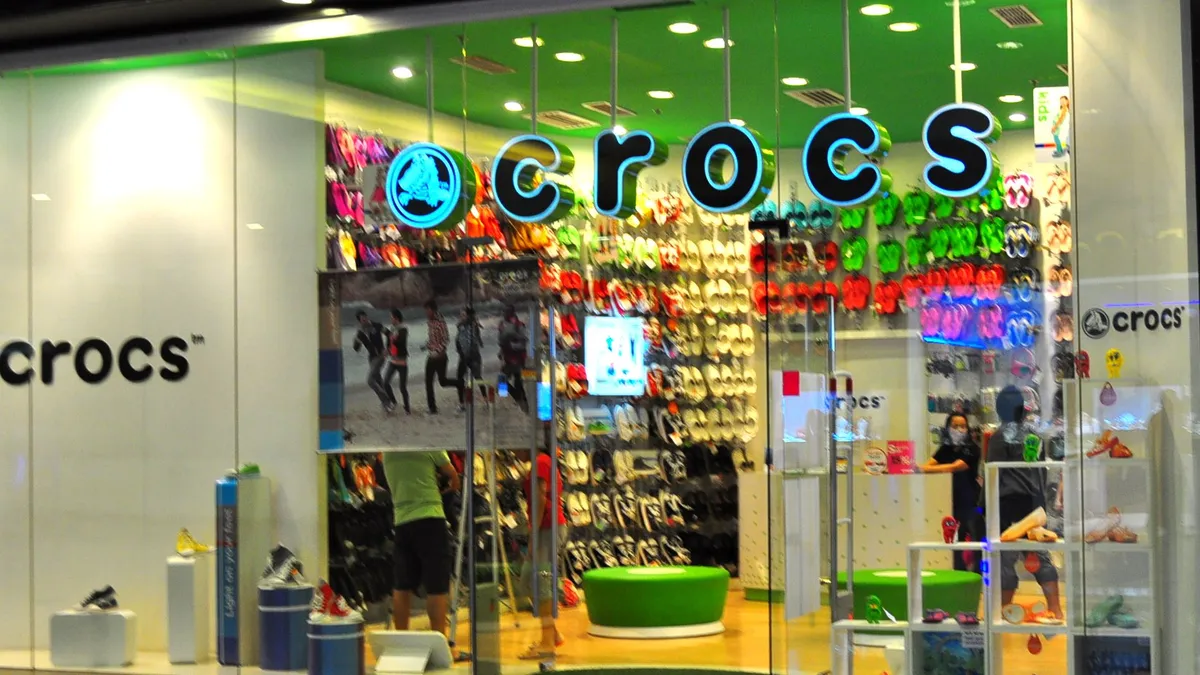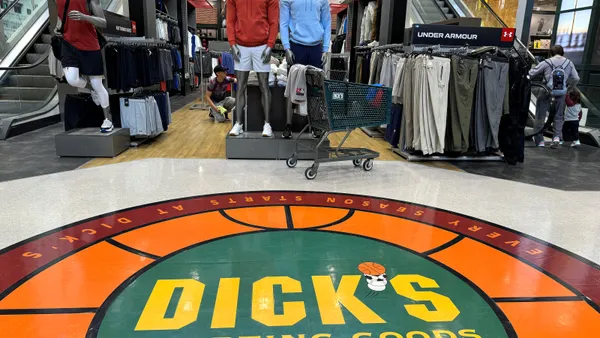Dive Brief:
- Crocs recorded a third-straight record quarter with revenue up 93% year over year to $640.8 million, according to a company release. Revenue in the quarter was also up 78.5% over the same period in 2019.
- As the shoe brand hones in on a digitally led strategy, digital sales in the quarter were up 25.4% and represented more than 36% of total revenue. Direct-to-consumer sales were up 78.6%, and wholesale was up 112.1%
- Crocs also announced it has set a goal of net zero carbon emissions in its business by 2030 with a plan centered on ingredients, packaging, resource use and product afterlife.
Dive Insight:
Comfort is having its day in the pandemic and work-from-home era. With a sharpened DTC strategy and a marketing apparatus built around influencers, celebrities and collaborations, Crocs specifically is on a tear.
With the brand and its distinctive clogs on the rise, the company has recently launched legal attacks on multiple others it accuses of ripping off its designs. In a July lawsuit, Crocs named more than a dozen companies, including Walmart and Hobby Lobby, that it says infringed on its trademark style, including its "3D Marks" — the holes at the top of its clogs that Crocs says are famous.
The inspiration behind Crocs' signature clog came from another company, Foam Creations, which developed shoes of a proprietary foam material that warded off moisture and odor, and were sold to sailors and gardeners. In 2002, three college friends had the idea to add a foam strap to the shoe, creating Crocs. The company would go on to acquire the Quebec-based Foam Creations, though residents of the latter's native province, according to the New York Times, consider Crocs to be one of the region's "great innovations."
Since the company's origin year of 2002, Crocs has gone from making $24,000 in annual sales to nearly $1.4 billion in 2020. Today, the company is seeking a "digital-led route to market," with continued double-digit growth in its DTC channel.
In an earnings presentation, the company also touted its brand and celebrity collaborations that help generate buzz around Crocs. In Q2, collaborations included luxury house Balenciaga, Russian rave band Little Big, South Korean snack brand Nongshim and London skate brand Palace Skateboards.
"[F]reight train-like" is how CL King analyst Steven Marotta described Crocs sales in a recent research note. "The success realized during the pandemic was the result of the top to bottom years-in-the-making revamp of the company," Marotta said. "While every operational and financial aspect was overhauled, success in the most front-facing three — product, marketing and digital distribution — would have, in our opinion, made CROX a darling in 2021 under any circumstances."
With rising sales, the brand is looking to slash its carbon emissions. As it eyes "net zero" carbon by the end of the decade, Crocs noted in its presentation that 85% of its products were sold without shoe boxes last year, helping to minimize its packaging footprint, and the carbon footprint per pair of its shoes was already low. The company is also finalizing a "more sustainable bio-based" version of the material it uses in its shoes (Croslite) and is looking into a circular supply chain, as well as recycling and re-commerce programs for its shoes.













